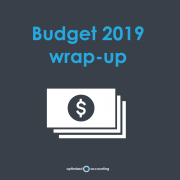Last year we had a double deal of government budgets, and without even coming full circle yet, it’s time for this year’s budget.
Businesses have limitations and compliance warnings to be aware of, but it’s not all pulling up your bootstraps with a few incentives you can make the most of. Watch our video for more details on the below points:
- If you’ve been used to writing off business assets instantly, think again: it’s now been capped at $20,000 per asset.
- A Small Business Energy Incentive that allows you to deduct more from your electricity-efficient assets, including upgrades.
- Starting in July, 2026, you’ll need to pay your employees superannuation on the same day as wages. This means you won’t be able to delay super as a batch at the end of every quarter.
- Struggling with getting your lodgements in order? For a certain period, if you accrued lodgement penalties, the ATO will remit lodgement fines to encourage you to engage with them again.
- ATO is cracking down on compliance with superannuation and GST: the government will support the ATO with over $600 million, so you may want to consider audit insurance.
- Are you doing a property development with more than 50 dwellings? Will you be retaining the properties to rent out? You’ll be able to claim more, and faster, but only if you offer extended leases.
Need more nitty-gritty? Read below for the stipulations:
1. Instant Asset write-off reduced to $20,000
From 1 July 2023 until 30 June 2024, the Government will decrease the instant asset write-off threshold to $20,000. This used to be at $150,000 for larger businesses and almost unlimited for smaller businesses.
Small businesses with an aggregated annual turnover of less than $10 million will be able to immediately deduct the full cost of eligible assets costing less than $20,000 that are first used or installed ready for use between 1 July 2023 and 30 June 2024. The $20,000 threshold will apply on a per-asset basis, so small businesses can instantly write off multiple assets.
Assets valued at $20,000 or more (which cannot be immediately deducted) can continue to be placed into the small business simplified depreciation pool and depreciated at 15% in the first income year and 30% each income year thereafter.
The provisions that prevent small businesses from re-entering the simplified depreciation regime for five years if they opt-out will continue to be suspended until 30 June 2024.
2. New Energy Incentive for small businesses
Small and medium businesses with an aggregated annual turnover of less than $50 million will be able to deduct an additional 20% of the cost of eligible depreciating assets that support electrification and more efficient use of energy. Up to $100,000 of total expenditure will be eligible for the Small Business Energy Incentive, with the maximum bonus deduction being $20,000.
A range of depreciating assets, as well as upgrades to existing assets, will be eligible for the Small Business Energy Incentive. These will include assets that upgrade to more efficient electrical goods (such as energy-efficient fridges), assets that support electrification (such as heat pumps and electric heating or cooling systems), and demand management assets (such as batteries or thermal energy storage). Full details of eligibility criteria will be finalised in consultation with stakeholders.
Eligible assets will need to be first used or installed ready for use between 1 July 2023 and 30 June 2024. Eligible upgrades will also need to be made in this period.
Certain exclusions will apply such as electric vehicles, renewable electricity generation assets, capital works, and assets that are not connected to the electricity grid and use fossil fuels.
3. Increasing the frequency of superannuation guarantee payments
From 1 July 2026, employers will be required to pay their employees’ superannuation guarantee entitlements on the same day that they pay salary and wages.
Currently, employers are only required to pay their employees’ superannuation guarantee on a quarterly basis. By increasing the payment frequency of superannuation to align with the payment of salary and wages, this measure aims to ensure employees have greater visibility over whether their entitlements have been paid and better enable the ATO to recover unpaid superannuation.
Changes to the design of the superannuation guarantee charge will also be necessary to align with increased payment frequency.
This package will particularly benefit those in lower paid, casual and insecure work who are more likely to miss out when superannuation guarantee is paid less frequently.
4. Lodgement penalty amnesty program
A lodgement penalty amnesty program is being provided for small businesses with an aggregated turnover of less than $10 million to encourage them to re-engage with the tax system.
The amnesty will remit failure-to-lodge penalties for outstanding tax statements lodged in the period from 1 June 2023 to 31 December 2023 that were originally due during the period from 1 December 2019 to 28 February 2022.
5. ATO Compliance
Investing in superannuation guarantee compliance
The Government will provide $40.2 million to the ATO in the 2024 income year, which includes $27 million for the ATO to improve data matching capabilities to identify and act on cases of superannuation guarantee underpayment by employers and $13.2 million for consultation and co-design.
Four-year extension for GST compliance program
The Government will provide $588.8 million to the ATO over four years from 1 July 2023 to continue a range of activities that promote GST compliance.
These activities will ensure businesses meet their tax obligations, including accurately accounting for and remitting GST, and correctly claiming GST refunds. Funding through this extension will also help the ATO develop more sophisticated analytical tools to combat emerging risks to the GST system.
6. Capital allowances – Accelerating the capital works tax deduction for ‘Build-To-Rent Developments’
For eligible new build-to-rent projects where construction commences after 7:30pm (AEST) on 9 May 2023 (Budget night), the Government will:
- increase the rate for the capital works tax deduction to 4% per year; and
- reduce the final withholding tax rate on eligible fund payments from managed investment trust (‘MIT’) investments from 30% to 15%.
This measure will apply to build-to-rent projects consisting of 50 or more apartments or dwellings made available for rent to the general public. The dwellings must be retained under single ownership for at least 10 years before being able to be sold and landlords must offer a lease term of at least three years for each dwelling.
7. What Wasn’t Mentioned?
- No extension to LMITO
- Div 7A Reform
- Skills and Tech Boost
- Stage 3 Tax Cuts
- Loss carry back still ending 30th June 2023
You already knew the news that would affect your business
We make sure what you need to know is in your inbox before it becomes urgent. Subscribe to our newsletter to be ahead of the curve:










